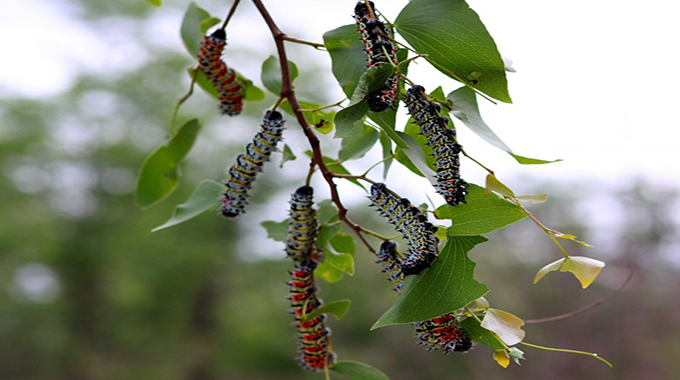
The Sunday News

Nobukhosi Ndlovu, Sunday News Reporter
THE persistent dry spell across Matabeleland South Province has resulted in poor mopane worm (amacimbi) harvests which is a source of livelihood and nutrition for communities.
Dry conditions caused by El Nino have affected mopane worms harvests in most parts of Matabeleland South, eliminating a crucial source of income for families who rely on sales of the seasonally occurring caterpillars called amacimbi in iSiNdebele and madora in ChiShona.

Traditionally, amacimbi are harvested for subsistence by rural communities but over the past decades, they have increasingly become a commercial commodity.
They thrive on fertile conditions and gorge themselves on lush green mopane leaves but the failure of those conditions mean that thousands of villagers in Matabeleland South and other parts of the country have been deprived of a vital source of nutrition.
Mrs Dima Ncube, from Kezi said they were experiencing a depletion of the commodity as a result of the dry spell.

Prof Mthuli Ncube
“Amacimbi thrive when it is moist and because of the prolonged dry spell, we have no hope of getting any this year. Rains are our only source for obtaining amacimbi but since it is like this, we have lost all hope,” she said.
Mrs Ncube said some villagers in Kezi depend on selling amacimbi (mopane worms) where they would get money to support their families.
“People here depend on amacimbi because that is where money for food, clothes and school fees comes from. Some had extended their markets to as far as South Africa and Botswana, that is how big amacimbi business had grown.
“The contribution of amacimbi to people’s livelihoods has become so significant to an extent that the dry spell has caused a strain to their social and financial provision,” she explained.
The amacimbi traders are invested in the business to an extent that they pitch tents and endure harsh weather conditions in the forest to collect them.
Locals have also been engaging in barter trade with others where they give out the amacimbi for clothes and groceries among other things.
Miss Hilda Tshuma, a trader from Gwanda said she makes seasonal trips to Bulawayo to sell a variety of wares, but confessed that it was the proceeds from her sales of amacimbi that formed a substantial part of her income which had suffered a knock this time due to the dry conditions.
“I am sad that there are no amacimbi this year and this means that I have to live off the groceries sent by my children working in the neighbouring South Africa. We do not know how life will be for us as we depend on amacimbi for money. The poor rains have affected our way of life in a big way,” she said adding that amacimbi have become a big economic product.
Presenting the 2025 budget, Finance Minister Mthuli Ncube projected that Zimbabwe’s economic growth will fall mainly due to the anticipated drought saying the Government was putting in place measures to cushion the communities.



